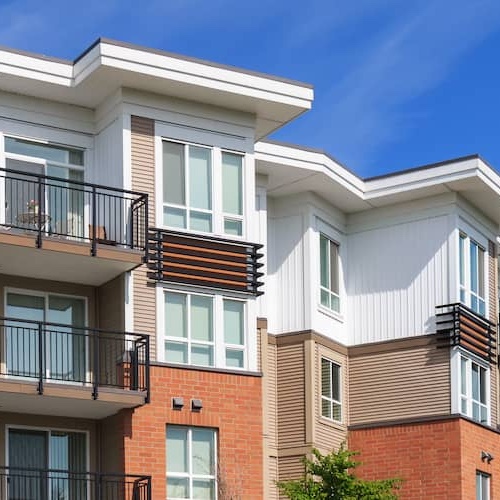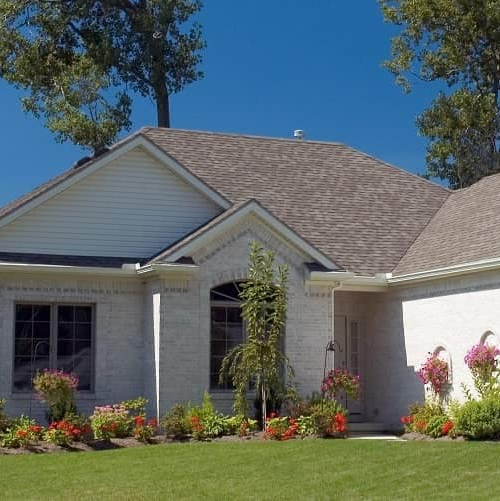Condo vs. apartment: What’s the difference?
Contributed by Tom McLean
Sep 10, 2025
•5-minute read

Buyers who want to own their home while retaining some of the benefits of apartment living may find what they’re looking for in a condominium. While condos share similarities with apartments, they’re not one and the same.
Key differences between condos and apartments
What exactly is the difference when it comes to a condo vs. an apartment? One big difference is that a condo is typically purchased and the owner builds equity, while an apartment is rented and the tenant builds no equity. Another is that renters have lower maintenance costs and greater flexibility.
Condos and apartments differ in various ways, including cost, maintenance, amenities, and more, but the most significant difference between them is ownership.
Ownership
Condos are owned, and apartments are rented. That means when you buy a condo, you build equity over time. Renting an apartment does not build equity.
Cost
The difference in cost isn’t just a mortgage payment vs. a rent payment. There also are differences in up-front fees and recurring costs. Mortgage payments on a condo can be higher or lower than apartment rent, depending on prevailing interest rates, home prices, and the rental market.
Condo costs
The costs of owning a condo comprise more than just the monthly mortgage payment. Here are a few of the other costs you’ll want to be aware of.
- Down payment: A down payment is a percentage of the condo’s purchase price that you pay out of pocket. This up-front payment will depend on the terms of your loan.
- Monthly mortgage payment: Your monthly payment may include homeowners insurance and property taxes, as well as private mortgage insurance.
- Homeowners insurance: Most mortgage lenders require homeowners insurance to protect their investment. It also protects your wallet and home by covering damage caused by certain natural disasters, fire, and vandalism.
- Property taxes: Every homeowner pays property taxes, which fund local services, like public schools, police, and fire safety.
- Utilities: As the property owner, you are responsible for paying for utilities as water, gas, electric, and trash collection.
- HOA fees: Many condos will have a condo association or HOA that collects fees from all its members. These fees help pay for amenities, community services, and maintenance of shared areas.
- Maintenance: When you own a property, it is your responsibility to maintain it.Apartment costs
- Renters’ costs usually are lower because the landlord is responsible for maintenance, property taxes, and homeowners insurance. However, some expenses are unique to apartments.
- Security deposit: A security deposit is an up-front fee you pay when you first sign your lease. This is kept by the landlord to pay for any damage that’s found after you move out. If you leave the apartment in good condition, you should get this deposit back.
- Monthly rental payment: This is the monthly cost of renting the space you live in. Your monthly rent is laid out in your lease and cannot change until your lease term is up.
- Rental insurance: Rental insurance usually is optional, though landlords can sometimes require it. It protects your personal property from unexpected loss.
- Utilities: The landlord may have you pay for some utilities, or they may be included in your rent.
Apartment costs
Renters’ costs usually are lower because the landlord is responsible for maintenance, property taxes, and homeowners insurance. However, some expenses are unique to apartments.
- Security deposit: A security deposit is an up-front fee you pay when you first sign your lease. This is kept by the landlord to pay for any damage that’s found after you move out. If you leave the apartment in good condition, you should get this deposit back.
- Monthly rental payment: This is the monthly cost of renting the space you live in. Your monthly rent is laid out in your lease and cannot change until your lease term is up.
- Rental insurance: Rental insurance usually is optional, though landlords can sometimes require it. It protects your personal property from unexpected loss.
- Utilities: The landlord may have you pay for some utilities, or they may be included in your rent.
Maintenance
In an apartment, the landlord typically is responsible for repairs. However, you should be familiar with your lease to understand what maintenance you might be responsible for. In a condo, the owner is responsible for maintaining the interior of their unit, while the HOA is responsibility for maintenance costs for common amenities and the building exterior.
Amenities
Apartments and condos often feature amenities such as pools, fitness centers, community spaces, and parking. The amenities will differ for each property, so you’ll want to find one that fits your preferences.
Rules and regulations
While owning affords you more freedom, condos typically have a condo board, cooperative, or HOA that sets rules you’ll need to follow. Apartments may not have HOAs, but the landlord or property manager may set rules you must follow as to how you can decorate and set up your space.
Advantages and drawbacks of buying a condo
It’s helpful to weigh the pros and cons of condo living before buying one.
Advantages of buying a condo
A condo allows you to own the place you’re living without some of the disadvantages of single-family homes or apartments.
- Building equity: Unlike renting an apartment, buying a condo allows you to build home equity. This lets you take advantage of any appreciation in the value of your condo.
- Freedom to customize: You have much more freedom to customize your living space than you would in an apartment.
- Stable housing payment: If you have a fixed-rate mortgage, your monthly mortgage payment will be more predictable.
Drawbacks of buying a condo
There also are drawbacks to condo living.
- Maintenance costs: You won’t have a landlord responsible for maintaining your condo. Depending on the age or quality of your condo, these maintenance costs can be significant.
- HOAs can be strict: HOAs have rules, covenants, and guidelines that can limit what you can do with your condo. Make sure to assess the HOA before you buy a condo so you know what you’re getting into.
- Significant up-front costs: When you buy a condo, you’ll need a down payment and must pay closing costs.
Advantages and drawbacks of renting an apartment
Apartment living can offer flexibility and affordability, but less freedom to make your living space completely your own.
Advantages of renting an apartment
When you rent an apartment, you have less responsibility and commitment.
- More flexibility: When you have an apartment, you’re usually only tied to your lease for a year or so. It’s much more challenging to sell a condo than to end a lease, and selling a condo after only a few years may come with a significant financial cost.
- Fewer maintenance costs: When you own a home and your furnace breaks, you have to pay to replace it. In an apartment, that responsibility falls to your landlord.
- Limited up-front costs: It’s common that your only up-front costs to rent an apartment are the security deposit and first month’s rent. That’s likely much cheaper than a down payment on a condo.
Drawbacks of renting an apartment
While apartment living may save you some money, there are drawbacks.
- No return on investment: When you own a condo with a mortgage, part of your monthly payment goes toward paying off your loan – helping you build equity in the home. When you rent, your monthly payment goes to your landlord.
- Major limitations on renovations: Because you likely won’t stay in the same apartment forever, landlords want to keep their apartments in good condition for the next tenant. To do so, they often have rules on customizing the space.
- Less stability: When renting an apartment, you’re only guaranteed to stay in your home for as long as your lease allows. Your rent may increase from year to year, or the landlord may refuse to renew your lease for any reason.
The bottom line: Condos are owned and apartments are rented
Apartments and condos share some similarities, including amenities and affordability, compared to living in a single home. The main difference between the two is that you own a condo and rent an apartment. Owning brings more responsibility and less flexibility, but often comes with the freedom to customize your space to truly make it your own.
If you’re ready to own, you can finance your condo purchase by starting the mortgage approval process today.

Dan Miller
Dan Miller is a freelance writer and founder of PointsWithACrew.com, a site that helps families to travel for free/cheap. His home base is in Cincinnati, but he tries to travel the world as much as possible with his wife and 6 kids.
Related resources

5-minute read
Condo vs. house: Which is best for you?
Trying to decide between buying a condo or a house? Learn the key differences in cost, maintenance, lifestyle, and more to make the right choice for you.
Read more
5-minute read
Are condos a good investment?
Condos can be an attractive option for first time buyers, but are they a good investment? Read our guide to find out whether buying a condo makes sense for you.
Read more
5-minute read
What to know about condo associations: Your guide to rules, fees and insurance
A condo association is a governing board composed of residents who live in the same housing development. Learn about condo association rules and fees.
Read more